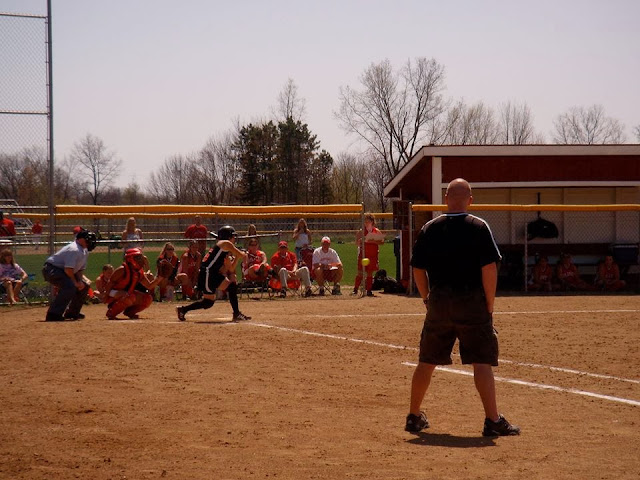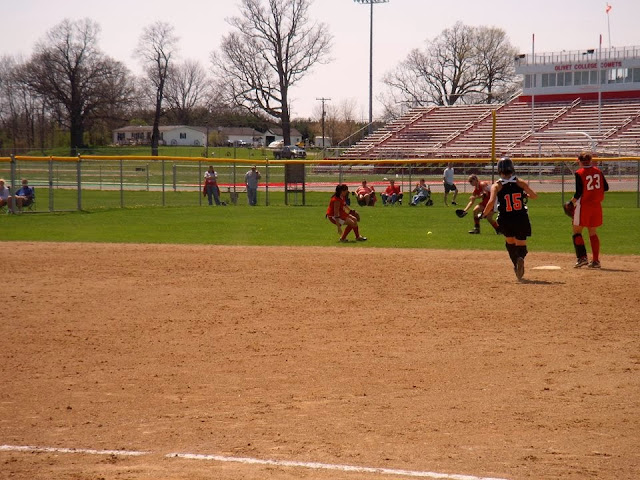This month, we are continuing our college programming series and this month specifically, we’ll be featuring athletes and students who were in a fraternity or sorority in college. Getting involved on a college campus plays a direct role in the rate of retention of students. Making friends and feeling “a part of the campus community” helps a student feel like they belong. Read the interview below of Kimberly Juwong, a Kalamazoo College (K-College) 2007 graduate who majored East Asian Studies with minors in Math and Chinese. Kim played softball for K, as the college is affectionately called, which is a Division III school. If you’re unsure of the lingo associated with sports and divisions here is a quick scope: under NCAA rules, Division I and Division II schools can offer scholarships to athletes for playing a sport. Division III schools may not offer any athletic scholarships. Generally, larger schools compete in Division I and smaller schools in II and III. If you are considering playing a sport in college, read the interview with Kimberly below and learn more about what the expectations are, the different levels (intramural, club, and intercollegiate [varsity]), and the benefits associated.
How long were you an athlete before you played in college? What made you decide to play a sport in college?
I played softball for 10 years before college, since I was in third grade. I hadn’t intended to play sports in college (I didn’t really know that I could!), but Kalamazoo College and the United States Coast Guard Academy were my top choices. Both schools were D III and wanted me on their team. I loved the game and decided that if it was an option, I wouldn’t pass it up.

Kim bunting a ball at one of her softball games
What position did you play? Was playing a sport in college any different than in high school? What are the expectations of someone who plays a sport in college? (i.e, GPA requirements, practice times, etc.)
In high school I played right field, almost exclusively. At K, I played centerfield, shortstop, and caught occasionally. My high school team was a Division B State Championship contender my senior year in high school, and our team was always at the top of the conference – we were extremely competitive. The level of competition was the biggest adjustment playing with K. We were at the bottom of the league, and there was one year we had trouble fielding a full team. That said, the expectations of playing were somewhat similar. Softball was a priority in high school, and that was the expectation in college as well. Balancing the rigor of academics and K and the time commitment to softball were often competing priorities during the spring.
Did you live in specific housing for athletes? What was your student experience like in college?
No, although I did live with my teammates as a junior and senior when we were permitted to live off campus. My student experience was very driven by my athletic experience. My closest friends both in college and since were teammates and were the core of my social network.
Did you play an intramural sport? Can you explain to a prospective student the difference in playing an intramural or club sport versus Intercollegiate (varsity)?
I did not. Intramural, club, and varsity sports are completely different. At K, intramurals were not particularly competitive – they were meant to be fun, recreational, and a way to socialize outdoors while being active. Practices weren’t held and the time commitment was minimal. There were only a few club sports at K, but the ones I was familiar with were intercollegiate (meaning they played teams from other colleges). The club teams had to support themselves financially and had very few designated resources from the college. They did hold practices and required more of a time commitment than intramural, but less than Varsity. Varsity sports, then, were a major time commitment – less so during the off-season, but there were still commitments then as well. We had 2-3 hours practices daily and would spend long hours driving to and from games. Weekends, spring break, and really every ounce of our time during season was dedicated to the game.

Kim Juwong running bases
Does playing a sport usually guarantee a scholarship or grant award at the institution you choose? If an athlete has an injury, do they lose their award? Please explain.
No. Division III schools do not offer athletic scholarships.
Are there any concerns or challenges with being a part of a sport? (i.e., hazing)
Hazing was not a concern at K. Time management was a major challenge. At K, staff turnover rate was also a considerable challenge. During my four years, we had three different coaches, all with different styles and different mechanics. The inconsistency of leadership made it feel like we did a lot of starting over.
Is it hard to balance a social life in college if playing a sport? What else were you a member of on or off-campus? How did you balance all of your commitments?
For me, softball was my social life. Without it, I think it would have been harder to maintain a social life. I worked a part-time job off-campus for the first few years of my undergraduate, and then on campus for my junior and senior years. It was definitely challenging, at times, to balance softball, school, and work, but it was expected that I would work less (and probably read less) during softball season.
What advice would you give to a prospective student contemplating on playing a sport in college?
Don’t pass up the opportunity – it is an amazing experience!
Did playing a sport make you a better student? If so, how? Besides financial, what are the other benefits of playing a sport?
Yes. Playing softball connected me with many other talented, ambitious women who set a great example and provided much needed academic and social support. Softball forced me to be productive and use my time wisely. Aside from the great group of friends I made playing softball, one of the major benefits was feeling connected to the school and other athletic teams. It was also a great way to stay active and gain valuable leadership and teamwork skills.
Do you think being a part of a sport helped you to get hired after graduation? What skills and abilities do athletes gain from playing a sport that employers recognize? (i.e., time management, leadership, etc)
There are certainly many valuable transferable skills: leadership, teamwork, time management, communication, and ability to deal with adversity, among others. I also think that playing a varsity sport shows commitment to living a healthy and active lifestyle, which is certainly attractive in an employee.
Anything else you’d like to tell students about joining a sport in college?
Playing a varsity sport is a MAJOR time commitment, even at at D III school, and that increases with the level of competition. However, it is entirely worth the periodic craziness to be part of something so meaningful. Everyone’s experience is really different, but I would highly recommend being a varsity athlete if you have the opportunity to do so. The other thing to consider is that for most people, this is really the last time you’ll be able to play the sport you love competitively. Few of us will go on to be professional athletes (if our sport even has a pro league) and recreational leagues are a ton of fun, but in a very different kind of way.
To summarize, how has being a part of a sport impacted you?
Playing softball at K was one of the best decisions I’ve made. Like I said, much of my social support came from my teammates and, to this day, the women I played with are the people I call my closest friends. For me, playing softball was also a great outlet from the academic stresses of college and helped to keep me fit and healthy. Being an athlete also contributed to the development of valuable life skills – communication, commitment, ability to deal with adversity, problem solving, work ethic, self-confidence, responsibility, etc., etc. While there were certainly many frustrations and challenges as well, the benefits were well worth it.
Anastasia R.D. Lopez, M.A. recently graduated with her Masters degree in Educational Leadership in Higher Education and Student Affairs degree from Western Michigan University. She earned her Bachelor of Science in Business Administration degree in Hospitality and Tourism Management from Robert Morris University. Her experience in higher education and student affairs ranges from Career Services, Academic Advising, working with first generation students, students with disabilities, international students, transfer students, undergraduate/graduate students, and study abroad and international education at both public and private universities. She also has related experience in business as well as hospitality and tourism management. Stasia is a Global Education Editor with Wandering Educators and lives with her husband, Fernando, in Michigan.
All photos courtesy and copyright Kimberly Juwong
